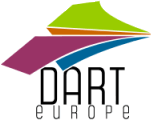Glosary
- Open access
- Thin archive
- Journal article [scientific]
- Audio-visual
- Self-archive
- Book chapter
- Electronic collection
- Communications to congresses, posters, etc.
- Creative Commons
- DSpace
- Datasets
- Declaration of Berlín
- Digital Depository
- Institutional documentation
- Embargo
- Old collection
- Types of deposit
- Interoperability
- User license
- Mandate
- Educational material
- Metadata
- Learning objects
- Open Access
- Open AIRE
- Open AIRE Plus
- Patent
- Peer-review
- Permissions
- Deposit policy
- Institutional open-access policy
- Open-access policies
- Portal
- Preprints
- Digital resource harvester
- Recommendation
- Repository / Institutional Repository
- Scientific review
- Bibliographic review
- Institution journals
- Open code software
- Ph.D. Thesis
- Final degree project
- Master's thesis
- Working papers
Public availability of certain content on the net free of charge, allowing it to be read, downloaded, copied, distributed, printed, searched for or linked to complete texts, with no economic, legal or technical barriers. The only condition is that the integrity of such texts be maintained and their authorship recognized when cited (Spanish Assoc. for Documentation and Information).
Digital document deposited in a repository, not by the author but by staff designated for the purpose.
A paper describing the results of research published in a periodical with scientific content. In the major scientific journals, the articles are peer-reviewed (see: peer review).
Production by an institution or its members with visual and/or sound content.
Deposit of a digital document by its author on a public website. When a document is self-archived in a system which meets with OAI (Open Archives Initiative) protocols, it can be searched for and accessed by generic or specific search engines, increasing its impact.
Collaboration by an author/researcher in a monograph, miscellanea or similar.
Set of publications including text, images, sound, etc., on electronic support (dictionaries, encyclopaedias, directories and other reference works, bibliographic databases, standards, manuals, guidelines and educational publications, electronic books and journals).
Any type of scholarly collaboration in a specialized scientific congress.
A non-profit organization offering alternatives to copyright or "all rights reserved". Authors may choose from four conditions of use which can be combined for six types of licenses, which go from the highest restriction ("all rights reserved") to no restriction (public domain).
The most widely used open-code software for open-access management of repositories worldwide. It can house any type of digital format: documents (books, articles, etc.), images, datasets, audio, video, websites, and so forth. As a data provider, it complies with the OAI-PMH protocol.
A collection of research data which is part of a study.
Signed on October 22, 2003 by representatives of some of the most important scientific institutions in Europe, among them the Max-Planck Society (Germany) or the Centre Nacional de la Recherche Scientifique (France), in support of Open Access and deposit in open access files, it encourages researchers and scientists to deposit their work in at least one repository.
A centralized space for storing and maintaining digital information. The depositories are prepared to be distributed, usually over a computer network such as the Internet. They may be open to public access or they may be protected and require prior authentication. The best known digital deposits are academic or institutional. Also see: Portal, Repository
Documents generated by an institution which are not the product of its educational or research activity.
Period of time during which the publisher reserves the exclusive right to exploit a paper it has published, usually six months to a year.
An institution's proprietary bibliographic collection. It is often digitalized and included in the institution's repository.
Deposit refers to the way in which digital objects are stored in an institutional repository. The pure forms are self-archive, where the producer stores the object himself, and thin archive, which is a service of the institution, usually the library, in charge of the archives, but in many institutions, both forms are combined leading to what is called a mixed archive.
The capability of repositories to communicate with each other and exchange processes and data. This is possible with the OAI-PMH protocol.
Authorisation by which the author of an article indicates what uses he allows to be made of it by third parties. There are different types of user licenses, from the most restrictive ("all rights reserved") to partial cession of the rights to exploitation under certain conditions or that specify a variety of possible uses under certain conditions (this is the case of Creative Commons Licenses).
Requirement imposed by an institution to deposit the result of academic and research activity in its repository. Mandatory policies reflect the institution's commitment to promoting open-access diffusion of research.
See: Learning objects.
Literally means "data about data". Data associated with information objects or systems for their description, administration, use, preservation, etc., which enable their identification, description and recovery of content of an electronic information resource. There are various types of metadata: - Descriptive (for identifying and locating) - Administrative (creation, rights, access control, etc.) - Structural (relating objects)
Digital materials created by faculty members as learning aids for their students.
Open access to scientific literature through the Internet permits free access to digital resources generated from scientific production, without economic barriers and without restrictions derived from copyrights. It is materialized by publishing in open-access journals or self-archive of articles in institutional or thematic repositories. Open access to this production is a way of amortizing a country's research investment by making free access to documents derived from it available to usershttp://www.accesoabierto.net/es/node/8
Infrastructure for free access to research. Digital deposits in DSpace must follow its guidelines. European Commission project for making 7FP/ERC publications visible. To do this, it proposes: - Construction of a technical support structure to facilitate deposit of manuscripts written under the 7th FP - Put a portal into operation which provides access to scientific publications and other functionalities with added value - Make a study of management and access to datasets in combination with research publications https://www.openaire.eu/oa-overview Repositories must meet the OpenAire guidelines for recall.
Its purpose is to link research data with scientific publications deposited.
Temporally limited right given to the owner by the government. This right allows the owner to impede third parties from using the item patented. The owner of the patent is the only one who can either use the item patented or authorise third parties to do so under the conditions set by the owner.
Process of evaluation and certification of quality of the research and its results done at the time of its publication. Articles in the major scientific journals are subject to this evaluation and review process before publication. Also called: Review by peers. Scientific review.
Understood as the privileges assigned to users of DSpace. Some of them would be creating collections, inserting books, modifying documents, etc. Authorisation/privileges which may be granted to certain users of a repository, such as creating collections or depositing documents.
Rules of the institution setting time limits on deposit and conditions of access to documents to be archived in the repository.
Set of actions an institution is committed to for the promotion and implantation of open access to scientific production. At universities this is approved by the Government Council.
Set of actions established for promoting and spreading open access to scientific production
Internet space which collects the information located in depositories or repositories and where the information in them may be searched for and acquired. It does not contain documents, but only notes a specific depository (e.g., E-Ciencia or Recolecta) Also see: Digital depository
Draft of the results of research before their peer review and publication for the purpose of showing them to a community of researchers.
Open-access platform which periodically compiles the metadata from collaborating repositories. They facilitate access to scientific contents from a multitude of repositories, contributing notably to their visibility. Metadata can only be collected if the repositories comply with the OAI-PMH protocol.
Institutional policy promoting open access by which it advises and urges, but does not require, authors to deposit the result of their scholarly and scientific production in the repository of the institution.
The set of services which an institution offers the members of its community for management and distribution of digital materials created by the institution and its members, organized in such a way that their proper administration is ensured, including long-term preservation, access and diffusion. Also known as: Institutional digital depository, digital archive, digital repository
See: Peer review
Article in which the content of a publication is briefly described and evaluated.
Periodicals published by an institution to disseminate its research in a specific area of knowledge or to publicize its academic and/or cultural activity.
Software source code available without restriction.
Unpublished research work for a Ph.D. degree.
Study done for an undergraduate degree. Also called FDP.
Study done for a Master's Degree. Also called MDT
SWorking documents in which ideas and arguments still in the development stage are shared with other researchers to promote debate and analysis for construction of new knowledge.




